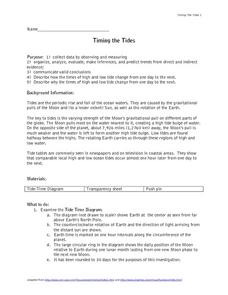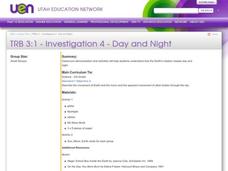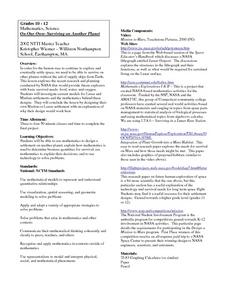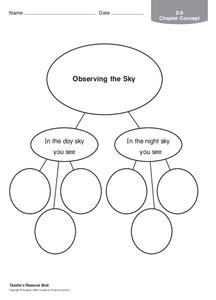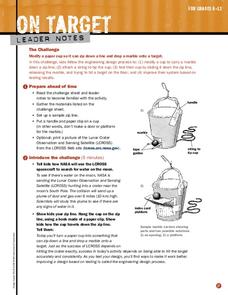Curated OER
Scavenger Hunt: Who am I?
In this space science worksheet, learners use the sites listed on the Solar System and Planets page of the Kid Zone to locate the names of the people credited with each discovery. They identify and name 26 different scientists who made...
Curated OER
Timing the Tides
Students collect data and describe how and why the high and low tides change from day to day. In exploring tides lesson students study tides by taking notes, recording data and analyzing their findings.
Curated OER
Watch This Space!
In this space worksheet, students, with a partner, answer five questions about the universe and read and discuss ten questions regarding astronomy.
Curated OER
Day and Night
Third graders view a classroom simulation that demonstrates how the Earth's rotation creates day and night.
Curated OER
Solar System: Uranus
Learners research Uranus and its geological formation, atmosphere, magnetic field, satellites, and rings.
Curated OER
Coloring Page - Wolf
In this coloring worksheet, students color a wolf. Students may write a story or discuss why the wolf is howling. Older students may use the picture as an illustration to a story. Students may use this a flashcard to identify animals.
Curated OER
A Garden on the Moon
Students identify criteria and constraints related to the design and development of a plant growth chamber. In this engineering lesson students apply the engineering design process to solve a problem.
Curated OER
"A Bright Moon Last Night" Comprehension Activity
In this reading comprehension learning exercise, students color a picture and read a sentence about it, then answer questions about the sentence read and practice tracing the word "night."
Curated OER
Making a Solar Eclipse Book: The Sun and Moon During a Solar Eclipse
Students make book covers displaying the Sun during a solar eclipse and a labeled illustration of the Sun.
Curated OER
Solar System: The Four Inner Planets and Earth's Moon and Astronauts
Second graders read THe Magic School Bus: Lost in the Solar System. In this language arts and science activity, 2nd graders explore the four inner planets. Students view the inner planets using Google Earth.
Curated OER
Howwwwl At The Moon
Students explore vowel digraphs. They discuss what a vowel digraph is and discuss the vowel digraph ou=/ow/. Students read "The Napping House." They practice spelling words with the /ow/ sound in them. Students read words with the /ow/...
Curated OER
On Our Own- Surviving on Another Planet
Students investigate current models for Lunar and Martian settlements and study the mathematics behind these designs. They design their own Lunar or Martian settlement with an explanation of why their model would work best.
Curated OER
Solar System
Eighth graders identify the basic concepts of celestial bodies. They discover the difference between perihelion and aphelion and demonstrate how the universe is expanding. They also discover how gravity and centrifugal force are...
Curated OER
Astronomy and the Cold War: How the United States Used the Moon to Target the Soviet Union
Students examine how astronomical observations were used to help target sites in the Soviet Union during Cold War and why such targeting was needed. Students then make predictions and observations of same astronomical events for their...
Curated OER
Earth and Beyond!
Young scholars investigate one or more of the following topics and develop a plan for the future regarding it: global warming, lunar exploration, space travel, Mars exploration, or terraforming. They disucss the audio files and the...
Curated OER
Observing the Sky
In this sky worksheet, students will write down 3 things they see in the sky during the day and 3 things they see in the sky at night. This worksheet is a graphic organizer.
Curated OER
Parts of the Universe
In this universe worksheet, students will complete a graphic organizer by writing in the different parts of the universe, including a brief description of each of these parts.
Curated OER
Earth
For this Earth worksheet, students respond to 5 different questions related to the Earth and its atmosphere. First, they determine the distance from Earth to the Sun and the distance across Earth. Then, students explain how long one...
Curated OER
Locations of Objects
In this locations of objects worksheet, students solve 5 different problems that include counting objects and determining where each is located. First, they identify the location of each object. Then, students fill-in the correct bubble...
Curated OER
Heavens Above
Students study the stars and their positions. In this astronomy lesson plan students see how scientists can predict the positions of the stars and can tell how they would have appeared in the past.
Mr. E. Science
Manned Space Exploration: From Apollo to Present
How did the manned space mission program progress? The presentation covers American space exploration from the Apollo missions through the International Space Station.
NASA
On Target
NASA's LCROSS mission is dropping a probe into a lunar crater. Groups design a system to travel down a zip line and drop a marble onto a target in the classroom. The groups then modify their designs based upon testing.
ESL Kid Stuff
Our World
There's a beautiful world all around us! Learn about the features of our planet with a series of activities designed for English learners. Kids sing, dance, and read about nature with fun lessons and interactive play.
NOAA
Tides
Low tides, high tides, spring tides, neap tides, diurnal tides, semidiurnal tides, mixed tides ... just how many types of tides are there? The 10th installment of a 23-part NOAA Enrichment in Marine sciences and Oceanography (NEMO)...
Other popular searches
- Walk Two Moons
- Moons Gravity
- Moons Craters
- Walk Two Moons Foreshadowing
- Walk Two Moons Novel
- Walk Two Moons Questions
- Moons, Comets, Asteroids
- Moon's Phase and Position
- Character Walk Two Moons
- Stars and Moons
- 15 Moons of Uranus
- Moons Surface and Structure



